The US and Vietnam are becoming better friends – a troubling prospect for China.
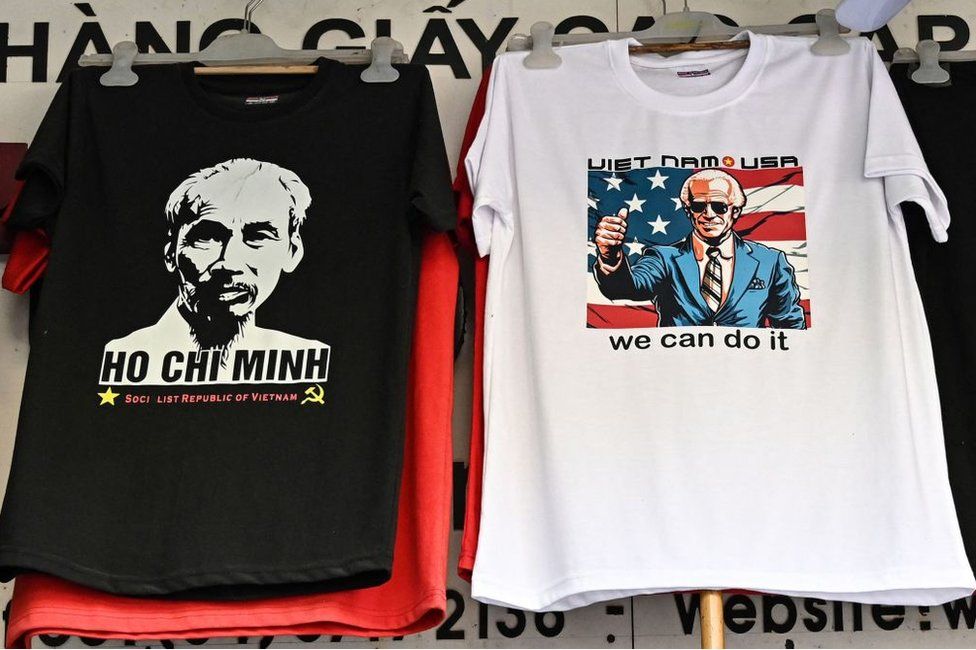 Image source, Getty Images
Image source, Getty ImagesPresident Joe Biden has denied that the US is attempting to stem China’s international influence, after signing a new historic deal with Vietnam.
More than 50 years since the last American soldier left Vietnam, Mr Biden travelled to Hanoi to sign the agreement that will bring the former foes closer than ever before.
The Comprehensive Strategic Partnership with Vietnam is a major relationship upgrade for the US. It is the culmination of a relentless push by Washington over the last two years to strengthen ties with Vietnam, which it sees as key to counter China’s influence in Asia.
It is also no small feat. The partnership with Washington is the highest level of diplomatic ties extended by Vietnam, one of China’s oldest and staunchest friends.
Mr Biden told reporters in Hanoi that American actions were not about containing or isolating China, but about maintaining stability in accordance with international rules.
“I think we think too much in terms of Cold War terms. It’s not about that. It’s about generating economic growth and stability, Mr Biden told reporters in Hanoi on Sunday, in response to a question from the BBC.
“I want to see China to succeed economically, but I want to see them succeed by the rules,” he said.
Signs of improved ties had already irked Beijing, which called them more evidence of America’s “cold-war mentality”.
But Hanoi has thought this through, says Le Hong Hiep from Singapore’s ISEAS-Yusof Ishak Institute, adding that the agreement with the US is “symbolic rather than [one of] substance”.
The Vietnamese dream
The title may be symbolic but closer ties could mean better business deals, and less reliance on China.
Vietnam has a young and highly educated workforce. It has also fostered a spirit of entrepreneurship which makes it highly attractive to US investors – especially those who are looking to move their manufacturing bases out of China.
Big names including Dell, Google, Microsoft and Apple have all shifted parts of their supply chains to Vietnam in recent years. The US also considers it a promising market for weapons and military equipment as Hanoi tries to wean off Moscow.
Washington is also keen to help Vietnam become an integral part of the world’s semiconductor supply chain and develop its electronics sector – areas which have become contentious as the US tries to restrict China’s access to advanced tech.
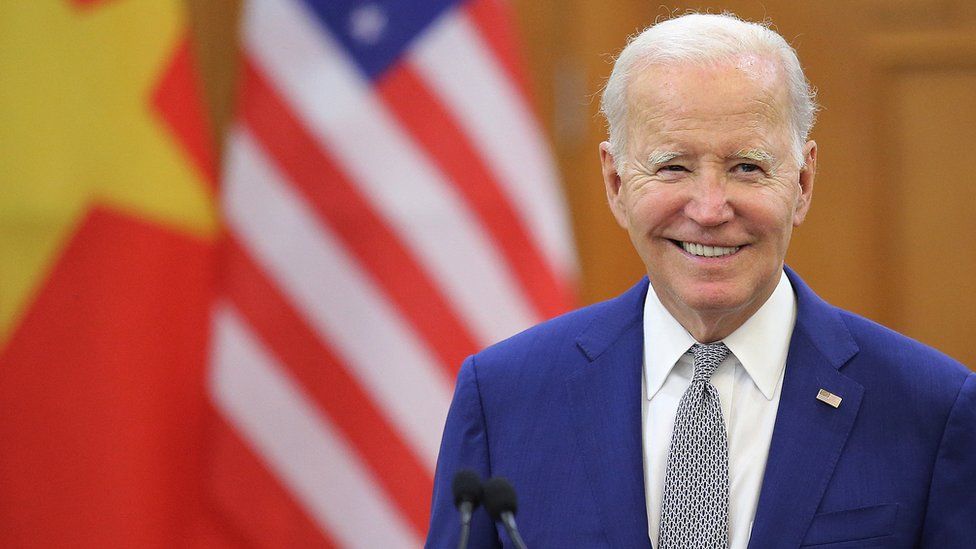
Image source, Getty Images
And yet Vietnam may not see its new partnership with the US as choosing one side or the other. As Beijing’s economy slows, Hanoi’s closer relationship with Washington is only pragmatic.
“I was in America for seven years and I knew about the American dream and I got that opportunity. But I thought, I have a bigger dream. The Vietnamese dream,” says Nguyen Huu Phuoc Nguyen , co-founder and CEO of Selex Motors.
He is standing in the company’s warehouse pointing at his e-scooter production line.
Mr Nguyen started the business five years ago. Now he has contracts with major delivery firms from Grab to Lazada.
He grew up in a tiny village in central Vietnam without electricity. In his lifetime, he has seen his country develop from one of the poorest in the world to one of the fastest growing economies in Asia.
“I wanted to contribute to build a prosperous and sustainable Vietnam, to fully utilise our opportunities and potential. We have missed a lot of opportunities. But I feel that it is the right time and we are the right generation to make it happen.”
While he talks, bosses of a Chinese delivery company are waiting in the wings to discuss a deal. Also watching are Foreign Office officials who accompanied the BBC throughout its rare visit to Vietnam.
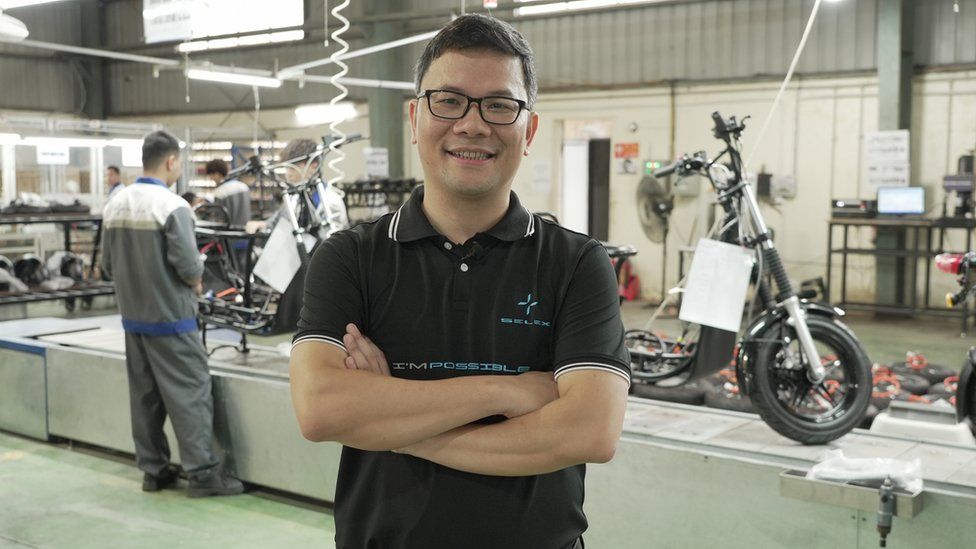
Image source, BBC/ Danny Bull
It was a clear sign of the challenge Mr Biden will face, juggling strategic interests with the defence of human rights and freedom.
Vietnam’s government critics face intimidation, harassment and imprisonment, according to Human Rights Watch.
The Communist Party has a stranglehold on the media and the state controls all print and broadcast outlets.
In China’s backyard
But Mr Biden may well look the other way because there is quite a lot riding on this for Washington.
The greatest win is that this partnership puts it in Beijing’s backyard.
The administration has worked hard to win Hanoi over. Mr Biden has dispatched his vice-president, his secretary of state, his secretary of defence and others to woo Vietnam over the last two years. US aircraft carriers also made stops in Vietnamese ports.
“It reflects the leading role that Vietnam will play in our growing network of partnerships in the Indo-Pacific as we look to the future,” Jake Sullivan, the White House national security adviser, said at a briefing before Mr Biden’s visit.
That “network of partnerships” across Asia has certainly grown in the last few months. Washington has negotiated the use of four new military bases in the Philippines and remarkably, it managed to broker a trilateral agreement with rival east Asian allies, Japan and South Korea.
Even getting those leaders in the same room was once impossible. It has also signed security pacts in the Pacific with the Solomon Islands.
The speed of this diplomacy appears to have “taken the Chinese by surprise,” said Dr John Hemmings, senior director of the Indo-Pacific Foreign and Security Policy Program at the Pacific Forum.
“Beijing perhaps didn’t realise how quickly Washington would capitalise on these successes,” Dr Hemmings says. ” Washington doesn’t want to say it is in a Cold War. Instead, it is making appeals to countries with liberal democracies or countries where sovereignty is at risk. This double-handed approach is becoming more attractive to the region.”
Vietnam may also be sending a warning shot to Beijing as the latter continues to encroach on its claims in the South China Sea.
Just last week, state media reported Vietnamese fishermen’s claims that a Chinese coastguard ship had fired a water cannon at their boat near the contested Paracel Islands.
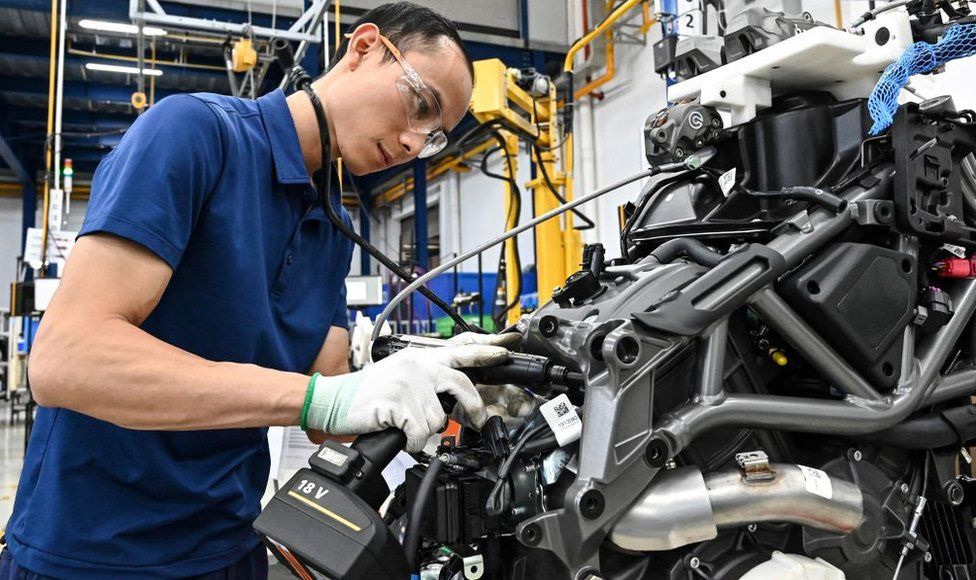
Image source, Getty Images
But Vietnam does not want to break up with China to be friends with the US, says Le Hong Hiep.
“In Vietnam’s calculation, enhanced ties with the United States should not lead to a deterioration in its relationship with China. We are already seeing some indications that Vietnam may even be receiving President Xi soon,” he added.
Hanoi has certainly preempted China’s response. Before Mr Biden’s visit, Nguyen Phu Trong, the General Secretary of the Communist Party of Vietnam, went to the border with China, where he met the Chinese ambassador and praised the countries’ friendship.
“No third country wants to take sides in a great power rivalry, but most countries in the region badly need international cooperation in various areas that are important for their prosperity and security,” said Alexander Vuving, professor at Asia Pacific Center for Security Studies.
“Leveraging these needs of regional countries is key to great power competition,” he added.
But there is no doubt that the US and Vietnam have become better friends, as Washington recruits more allies in Asia.
Polls suggest that the US is hugely admired in Vietnam. The horrors of one of the most brutal wars of the 20th Century are not forgotten, but mutual trust has grown since diplomatic ties were normalised in 1995.
Both countries have worked together to help recover the remains of US soldiers missing in action, and Washington has also assisted Vietnam in identifying the remains of its own soldiers.
And each year, tens of thousands of Vietnamese students travel to study in the US, and that has supported the road to reconciliation.
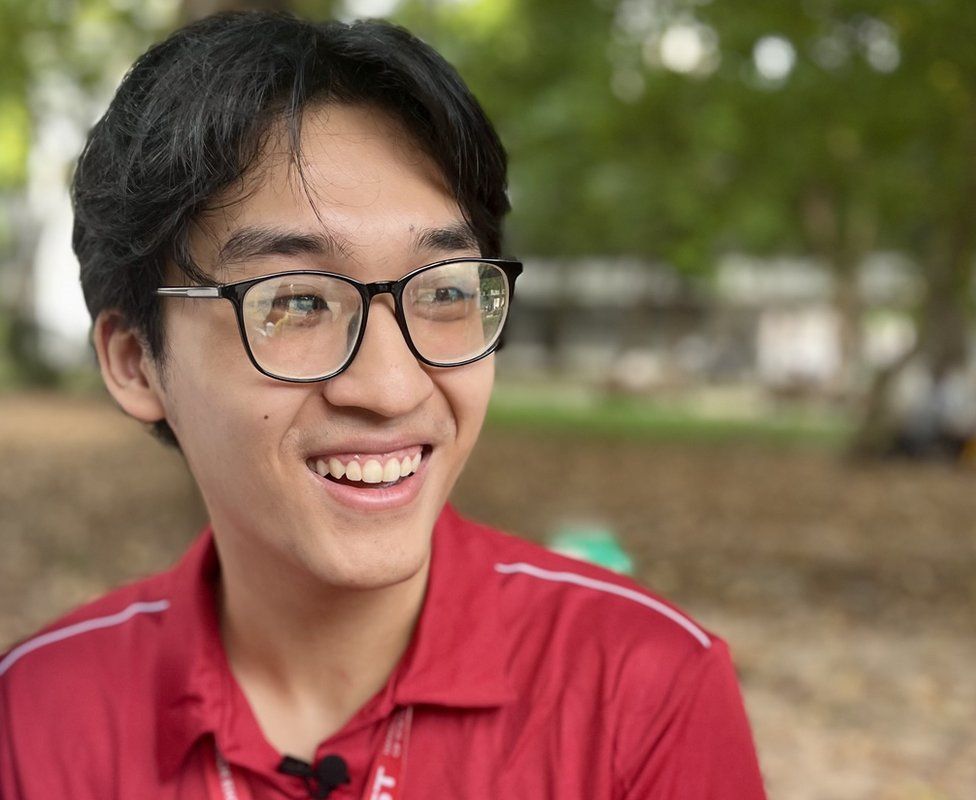
Image source, BBC/ Lindle Markwell
“We are students of HUST, we are bright, we are young, we have strength,” a group of students chants at the Hanoi University of Science and Technology, under the watchful eye of the government officials escorting the BBC.
Elsewhere one young man has grabbed a guitar and plays a popular Vietnamese song about appreciating what you have.
“Korean and Japanese technology firms are pumping money into Vietnam to develop technology centres, and now comes the US,” says Luong Hong Duong, a second-year student.
“I can see in the future Vietnam will become another Silicon Valley for the US and everyone will come here and work. I can’t wait for it to happen.”